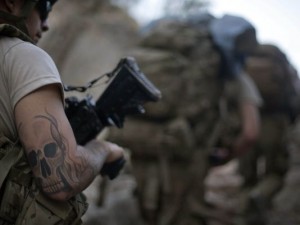
New SMA to take serious look at Army tattoo policy
JOINT BASE LEWIS-McCHORD, Wash. — Soldiers’ strong objections to the Army’s tattoo policy have caught Sergeant Major of the Army Dan Dailey by surprise — and he’s planning to measure the extent of this dissatisfaction, across the service.
“I don’t want this to be the deciding factor for a good soldier to get out,” said Dailey, who took over as the Army’s top enlisted leader on Jan. 30.
If he finds this to be a force-wide issue, Dailey said action may be necessary. The SMA said he will keep an ear out for soldier concerns on tattoos, and any other issues, in the weeks and months to come.
This week Dailey embarked on his first troop visit as SMA, heading to JBLM.
On Monday, he fielded questions from a group of Warrior Leader Course students, who raised the issue of the service’s tattoo policy, which was tightened last year.
One solder stood up and argued that tattoos should be allowed, so long as they are not visible when a soldier is in his dress uniform.
“How many of you agree with that?” Dailey asked the group of about 100 soldiers.
Almost all of them immediately raised their hands.
Looking surprised, Dailey asked: “How big of a deal is this for soldiers? I want to hear your thoughts. I want to hear your opinions.”
“A big deal,” many of the soldiers said, with others nodding their heads in agreement. They also added that some may choose to leave the Army or decide not to seek a commission because of their ink. They also cited concerns about missing out on a prospective recruit because of the policy.
The update to Army Regulation 670-1 was released in March and updated in September. It limits the number of tattoos soldiers can have below the elbow and knee. The regulation initially barred soldiers who ran afoul of the rules from requesting a commission, sparking anger among many soldiers. The September update grandfathered enlisted seeking a commission or appointment, as long as they have their commander’s endorsement.
After his session with the WLC students, Dailey told Army Times he was surprised by the soldiers’ almost overwhelming opposition to the tattoo policy.
“I thought this had settled quite a bit,” he said. “Obviously it has not.”
There must be a balance between the tattoo policy and discipline and standards, Dailey said, adding that the American people have a perception of what an American soldier should look like.
“How do you want to be perceived?” Dailey asked the soldiers. “What is the image an American soldier should carry? What does the nation think about my soldiers? What should the standard be?”
Dailey’s predecessor, Sergeant Major of the Army Raymond Chandler, strongly believed the initial uproar about tattoos had waned. Chandler based this fact on trips across the Army and feedback from soldiers. In his exit interview with Army Times, Chandler said he felt media coverage inflated the issue, and made it appear more controversial than it was.
However, looking back, Chandler said he could have done a better job early on of explaining why the Army was moving toward the stricter regulation.
“This has absolutely nothing to do with your performance on the battlefield,” Chandler said at the time. “It all has to do with how we want to see ourselves as professionals.”
Dailey plans to visit the installations that are home to the Army’s corps and divisions in the next 90 days.
“I need to be well informed,” he said. “One installation’s not enough to go back to the [Army chief of staff] and say there’s an issue or concern. Something I’ve learned over time is to be less emotional and more informed.”





Leave a Reply